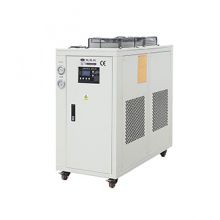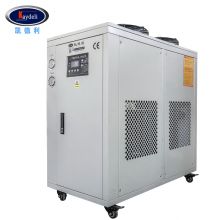We offer you 100% custom-made service Inquiry
Oil cooled chillers are widely used across various industries, including manufacturing, HVAC systems, and food processing. These systems use oil as a cooling medium to absorb and transfer heat efficiently. While they offer several benefits, such as superior cooling in high-heat environments, they also come with environmental challenges.
This article delves into the environmental concerns associated with oil cooled chillers, focusing on energy consumption, oil leakage, waste oil disposal, and refrigerant use. It also explores strategies for minimizing the ecological footprint of these systems.
Oil cooled chillers use oil as a heat transfer fluid, unlike traditional systems that rely on water or air. The oil circulates through the system, absorbing heat and releasing it via the condenser. This type of chiller is particularly valuable in industries that require precise temperature control and are often operated in extreme conditions where water cooling may not be viable.
These chillers are commonly used in sectors like electronics manufacturing, plastic production, and large-scale HVAC applications. Their ability to function efficiently under demanding conditions is one of the primary reasons they are chosen for specific industrial processes.

One of the key environmental issues with oil cooled chillers is their energy consumption. Older models, in particular, tend to use more energy than other types of cooling systems. This higher energy usage leads to greater greenhouse gas emissions and a higher overall environmental impact.
Oil cooled chillers can be less efficient when compared to air or water-cooled systems, especially in terms of electricity usage. This inefficiency results in higher operational costs and a larger carbon footprint, making it essential to find ways to improve energy use.
Improving energy efficiency can be achieved through the integration of advanced technologies, such as variable speed drives and intelligent control systems, which help optimize the cooling process and reduce energy consumption.
Another significant concern is oil leakage. If an oil cooled chiller develops a leak, the oil can spill into the environment, contaminating the soil, water, and air. This can have devastating effects, particularly if the oil is harmful to ecosystems and wildlife. Over time, oil contamination can persist, causing long-term damage to the environment.
Leaks are often the result of poor maintenance, worn-out seals, or mechanical failure. Addressing this issue requires robust design and proactive maintenance practices to minimize risks.
To minimize leakage, many modern systems are designed with advanced sealing systems and incorporate features that reduce the likelihood of oil spills. Regular maintenance is a critical part of this effort. Ongoing support ensures the systems remain in optimal working condition, helping prevent oil leakage from becoming a major concern.
When oil is replaced in a chiller, it becomes waste oil. Improper disposal of this waste can have severe environmental consequences. If discarded improperly, waste oil can contaminate water sources and soil, posing risks to wildlife and human health.
Proper disposal of waste oil is vital to prevent pollution. Clear guidelines and services for safe collection, recycling, and disposal practices help ensure that oil is managed in an environmentally responsible manner. Recycling and filtration systems can also help reduce waste and reuse oil, minimizing the environmental impact.
The refrigerants used in oil cooled chillers are another area of concern. Traditional refrigerants like CFCs and HCFCs are being phased out due to their harmful effects on the ozone layer and their high global warming potential (GWP). Even newer refrigerants still contribute to global warming if they leak into the atmosphere.
Many modern systems prioritize the use of low-GWP refrigerants and implement design improvements to minimize refrigerant leaks, ensuring that the overall environmental impact is significantly reduced.

To reduce the energy consumption of oil cooled chillers, several technological advancements have been made. High-efficiency compressors, variable-speed motors, and smart control systems have been integrated into newer systems to optimize energy use. These systems adjust their operation based on demand, ensuring that energy is only used when necessary, making the system more energy-efficient and lessening its carbon footprint.
Preventing oil leaks and ensuring proper system maintenance are essential for reducing environmental damage. Regular servicing and inspections help identify potential issues before they escalate. With well-maintained systems, the risk of leaks is greatly minimized, and the equipment operates at peak efficiency.
The transition to low-GWP refrigerants is an important step in minimizing the environmental impact of cooling systems. Modern systems are designed to reduce refrigerant leaks and maximize efficiency, contributing to more sustainable cooling solutions. Additionally, using durable materials that increase the lifespan of equipment helps reduce waste and ensures a longer product lifecycle.
While oil cooled chillers provide excellent performance in high-demand environments, their environmental impact cannot be overlooked. However, with the right technology, maintenance practices, and commitment to sustainability, the negative effects can be minimized.
The ongoing integration of energy-saving technologies, eco-friendly refrigerants, and regular maintenance ensures that oil cooled chillers can be a sustainable solution for industries seeking reliable and efficient cooling. By adopting these best practices, businesses can continue to benefit from high-performance cooling while minimizing their environmental footprint.
By continuing to use the site you agree to our privacy policy Terms and Conditions.